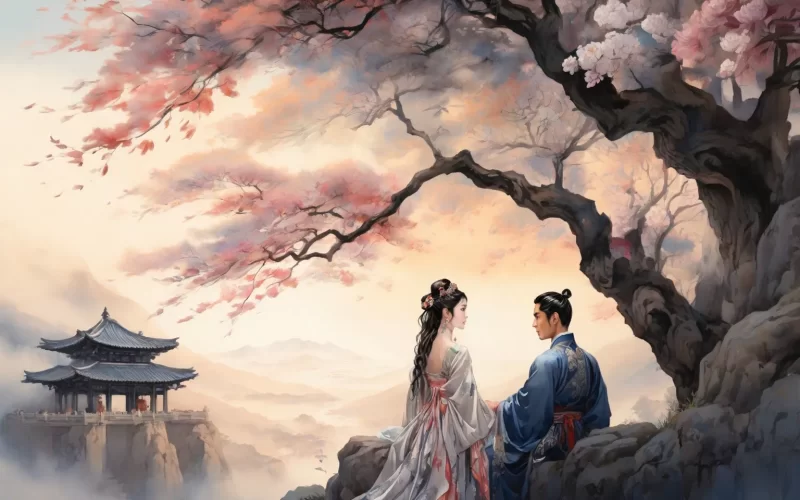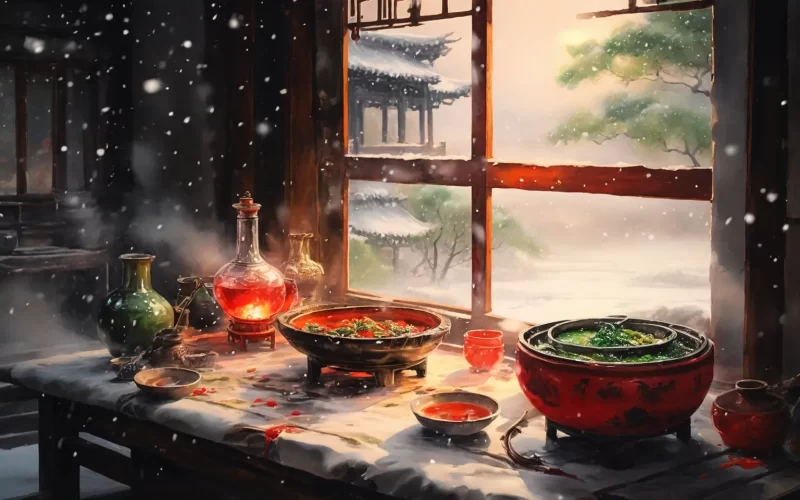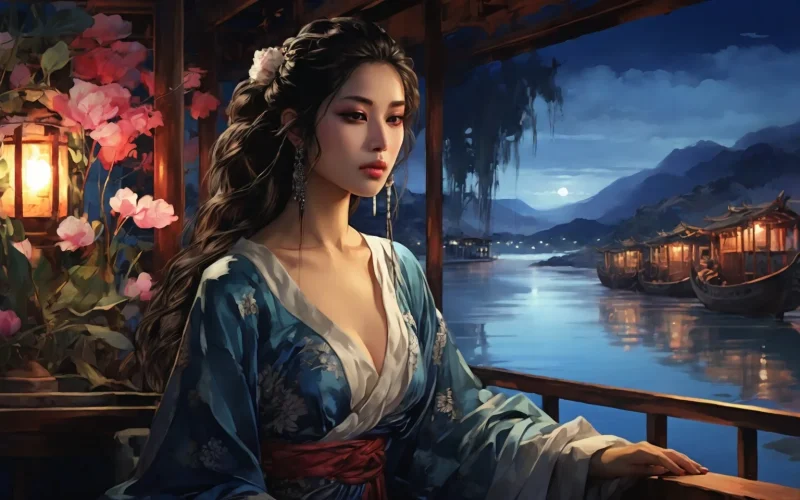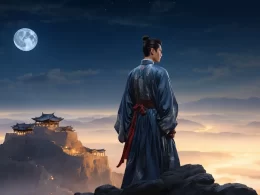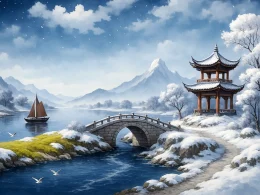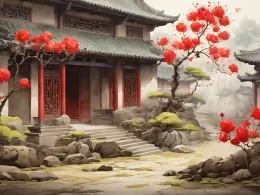China's Emperor, craving beauty that might shake an empire,
Was on the throne for many years, searching, never finding,
Till a little child of the Yang clan, hardly even grown,
Bred in an inner chamber, with no one knowing her,
But with graces granted by heaven and not to be concealed,
At last one day was chosen for the imperial household.
If she but turned her head and smiled, there were cast a hundred spells,
And the powder and paint of the Six Palaces faded into nothing.
...It was early spring. They bathed her in the FlowerPure Pool,
Which warmed and smoothed the creamy-tinted crystal of her skin,
And, because of her languor, a maid was lifting her
When first the Emperor noticed her and chose her for his bride.
The cloud of her hair, petal of her cheek, gold ripples of her crown when she moved,
Were sheltered on spring evenings by warm hibiscus curtains;
But nights of spring were short and the sun arose too soon,
And the Emperor, from that time forth, forsook his early hearings
And lavished all his time on her with feasts and revelry,
His mistress of the spring, his despot of the night.
There were other ladies in his court, three thousand of rare beauty,
But his favours to three thousand were concentered in one body.
By the time she was dressed in her Golden Chamber, it would be almost evening;
And when tables were cleared in the Tower of Jade, she would loiter, slow with wine.
Her sisters and her brothers all were given titles;
And, because she so illumined and glorified her clan,
She brought to every father, every mother through the empire,
Happiness when a girl was born rather than a boy.
...High rose Li Palace, entering blue clouds,
And far and wide the breezes carried magical notes
Of soft song and slow dance, of string and bamboo music.
The Emperor's eyes could never gaze on her enough-
Till war-drums, booming from Yuyang, shocked the whole earth
And broke the tunes of The Rainbow Skirt and the Feathered Coat.
The Forbidden City, the nine-tiered palace, loomed in the dust
From thousands of horses and chariots headed southwest.
The imperial flag opened the way, now moving and now pausing- -
But thirty miles from the capital, beyond the western gate,
The men of the army stopped, not one of them would stir
Till under their horses' hoofs they might trample those moth- eyebrows....
Flowery hairpins fell to the ground, no one picked them up,
And a green and white jade hair-tassel and a yellowgold hair- bird.
The Emperor could not save her, he could only cover his face.
And later when he turned to look, the place of blood and tears
Was hidden in a yellow dust blown by a cold wind.
...At the cleft of the Dagger-Tower Trail they crisscrossed through a cloud-line
Under Omei Mountain. The last few came.
Flags and banners lost their colour in the fading sunlight...
But as waters of Shu are always green and its mountains always blue,
So changeless was His Majesty's love and deeper than the days.
He stared at the desolate moon from his temporary palace.
He heard bell-notes in the evening rain, cutting at his breast.
And when heaven and earth resumed their round and the dragon car faced home,
The Emperor clung to the spot and would not turn away
From the soil along the Mawei slope, under which was buried
That memory, that anguish. Where was her jade-white face?
Ruler and lords, when eyes would meet, wept upon their coats
As they rode, with loose rein, slowly eastward, back to the capital.
...The pools, the gardens, the palace, all were just as before,
The Lake Taiye hibiscus, the Weiyang Palace willows;
But a petal was like her face and a willow-leaf her eyebrow --
And what could he do but cry whenever he looked at them?
...Peach-trees and plum-trees blossomed, in the winds of spring;
Lakka-foliage fell to the ground, after autumn rains;
The Western and Southern Palaces were littered with late grasses,
And the steps were mounded with red leaves that no one swept away.
Her Pear-Garden Players became white-haired
And the eunuchs thin-eyebrowed in her Court of PepperTrees;
Over the throne flew fire-flies, while he brooded in the twilight.
He would lengthen the lamp-wick to its end and still could never sleep.
Bell and drum would slowly toll the dragging nighthours
And the River of Stars grow sharp in the sky, just before dawn,
And the porcelain mandarin-ducks on the roof grow thick with morning frost
And his covers of kingfisher-blue feel lonelier and colder
With the distance between life and death year after year;
And yet no beloved spirit ever visited his dreams.
...At Lingqiong lived a Taoist priest who was a guest of heaven,
Able to summon spirits by his concentrated mind.
And people were so moved by the Emperor's constant brooding
That they besought the Taoist priest to see if he could find her.
He opened his way in space and clove the ether like lightning,
Up to heaven, under the earth, looking everywhere.
Above, he searched the Green Void, below, the Yellow Spring;
But he failed, in either place, to find the one he looked for.
And then he heard accounts of an enchanted isle at sea,
A part of the intangible and incorporeal world,
With pavilions and fine towers in the five-coloured air,
And of exquisite immortals moving to and fro,
And of one among them-whom they called The Ever True-
With a face of snow and flowers resembling hers he sought.
So he went to the West Hall's gate of gold and knocked at the jasper door
And asked a girl, called Morsel-of-Jade, to tell The Doubly- Perfect.
And the lady, at news of an envoy from the Emperor of China,
Was startled out of dreams in her nine-flowered, canopy.
She pushed aside her pillow, dressed, shook away sleep,
And opened the pearly shade and then the silver screen.
Her cloudy hair-dress hung on one side because of her great haste,
And her flower-cap was loose when she came along the terrace,
While a light wind filled her cloak and fluttered with her motion
As though she danced The Rainbow Skirt and the Feathered Coat.
And the tear-drops drifting down her sad white face
Were like a rain in spring on the blossom of the pear.
But love glowed deep within her eyes when she bade him thank her liege,
Whose form and voice had been strange to her ever since their parting --
Since happiness had ended at the Court of the Bright Sun,
And moons and dawns had become long in Fairy-Mountain Palace.
But when she turned her face and looked down toward the earth
And tried to see the capital, there were only fog and dust.
So she took out, with emotion, the pledges he had given
And, through his envoy, sent him back a shell box and gold hairpin,
But kept one branch of the hairpin and one side of the box,
Breaking the gold of the hairpin, breaking the shell of the box;
"Our souls belong together," she said, " like this gold and this shell --
Somewhere, sometime, on earth or in heaven, we shall surely
And she sent him, by his messenger, a sentence reminding him
Of vows which had been known only to their two hearts:
"On the seventh day of the Seventh-month, in the Palace of Long Life,
We told each other secretly in the quiet midnight world
That we wished to fly in heaven, two birds with the wings of one,
And to grow together on the earth, two branches of one tree."
Earth endures, heaven endures; some time both shall end,
While this unending sorrow goes on and on for ever.
Original Poem:
「长恨歌」
白居易
汉皇重色思倾国,御宇多年求不得。
杨家有女初长成,养在深闺人未识。
天生丽质难自弃,一朝选在君王侧。
回眸一笑百媚生,六宫粉黛无颜色。
春寒赐浴华清池,温泉水滑洗凝脂。
侍儿扶起娇无力,始是新承恩泽时。
云鬓花颜金步摇,芙蓉帐暖度春宵。
春宵苦短日高起,从此君王不早朝。
承欢侍宴无闲暇,春从春游夜专夜。
后宫佳丽三千人,三千宠爱在一身。
金屋妆成娇侍夜,玉楼宴罢醉和春。
姊妹弟兄皆列土,可怜光彩生门户。
遂令天下父母心,不重生男重生女。
骊宫高处入青云,仙乐风飘处处闻。
缓歌谩舞凝丝竹,尽日君王看不足。
渔阳鼙鼓动地来,惊破霓裳羽衣曲。
九重城阙烟尘生,千乘万骑西南行。
翠华摇摇行复止,西出都门百余里。
六军不发无奈何,宛转蛾眉马前死。
花钿委地无人收,翠翘金雀玉搔头。
君王掩面救不得,回看血泪相和流。
黄埃散漫风萧索,云栈萦纡登剑阁。
峨嵋山下少人行,旌旗无光日色薄。
蜀江水碧蜀山青,圣主朝朝暮暮情。
行宫见月伤心色,夜雨闻铃肠断声。
天旋地转回龙驭,到此踌躇不能去。
马嵬坡下泥土中,不见玉颜空死处。
君臣相顾尽沾衣,东望都门信马归。
归来池苑皆依旧,太液芙蓉未央柳。
芙蓉如面柳如眉,对此如何不泪垂。
春风桃李花开日,秋雨梧桐叶落时。
西宫南内多秋草,落叶满阶红不扫。
梨园弟子白发新,椒房阿监青娥老。
夕殿萤飞思悄然,孤灯挑尽未成眠。
迟迟钟鼓初长夜,耿耿星河欲曙天。
鸳鸯瓦冷霜华重,翡翠衾寒谁与共。
悠悠生死别经年,魂魄不曾来入梦。
临邛道士鸿都客,能以精诚致魂魄。
为感君王辗转思,遂教方士殷勤觅。
排空驭气奔如电,升天入地求之遍。
上穷碧落下黄泉,两处茫茫皆不见。
忽闻海上有仙山,山在虚无缥渺间。
楼阁玲珑五云起,其中绰约多仙子。
中有一人字太真,雪肤花貌参差是。
金阙西厢叩玉扃,转教小玉报双成。
闻道汉家天子使,九华帐里梦魂惊。
揽衣推枕起徘徊,珠箔银屏迤逦开。
云鬓半偏新睡觉,花冠不整下堂来。
风吹仙袂飘飘举,犹似霓裳羽衣舞。
玉容寂寞泪阑干,梨花一枝春带雨。
含情凝睇谢君王,一别音容两渺茫。
昭阳殿里恩爱绝,蓬莱宫中日月长。
回头下望人寰处,不见长安见尘雾。
惟将旧物表深情,钿合金钗寄将去。
钗留一股合一扇,钗擘黄金合分钿。
但教心似金钿坚,天上人间会相见。
临别殷勤重寄词,词中有誓两心知。
七月七日长生殿,夜半无人私语时。
在天愿作比翼鸟,在地愿为连理枝。
天长地久有时尽,此恨绵绵无绝期。
Interpretation:
“Song of Everlasting Sorrow” is one of the representative works of Bai Juyi, a renowned poet of the Tang Dynasty. It was written in the first year of Emperor Xianzong’s Yuanhe reign (806), when Bai Juyi visited Xianyou Temple and was inspired by the tragic love story of Emperor Xuanzong and Lady Yang. Combining historical facts with folklore, the poet created this legendary tale. The poem takes the tragic love between Emperor Xuanzong and Lady Yang as its central thread, depicting the extravagant life in the imperial palace, the outbreak of the An Lushan Rebellion, the heartbreaking farewell at Mawei Slope, Emperor Xuanzong’s endless longing in his later years, and their fantastical reunion in the celestial realm. Through these scenes, the poem weaves an epic love legend, creating one of the most influential love poems in the history of Chinese classical literature. With its grand structure, sincere emotions, and beautiful language, it stands as a pinnacle of classical Chinese narrative poetry.
Part One: The Emperor and His Beloved — From Encounter to Ultimate Favor
汉皇重色思倾国,御宇多年求不得。 杨家有女初长成,养在深闺人未识。 天生丽质难自弃,一朝选在君王侧。 回眸一笑百媚生,六宫粉黛无颜色。 春寒赐浴华清池,温泉水滑洗凝脂。 侍儿扶起娇无力,始是新承恩泽时。 云鬓花颜金步摇,芙蓉帐暖度春宵。 春宵苦短日高起,从此君王不早朝。 承欢侍宴无闲暇,春从春游夜专夜。 后宫佳丽三千人,三千宠爱在一身。 金屋妆成娇侍夜,玉楼宴罢醉和春。 姊妹弟兄皆列土,可怜光彩生门户。 遂令天下父母心,不重生男重生女。
Emperor Xuanzong cherished beauty and sought the most enchanting woman under heaven, yet found none to his satisfaction for years — until Lady Yang entered his life. Her captivating beauty outshone all the palace maidens, winning the emperor’s undivided favor. Her days were filled with spring outings and moonlit banquets, basking in exclusive affection. Through her, the Yang family rose to power and wealth, so much so that people throughout the realm envied those with daughters rather than sons.
This section opens with Emperor Xuanzong’s tireless search for the ultimate beauty, culminating in the entrance of Lady Yang into the palace. With lavish language, the poet paints her unrivaled charm, the extravagance of palace life, and Xuanzong’s indulgence in her company. The Yang family’s rapid rise to power foreshadows the tragedy to come, laying the emotional foundation for the "everlasting sorrow."
Part Two: Rebellion and the Tragedy at Mawei
骊宫高处入青云,仙乐风飘处处闻。 缓歌谩舞凝丝竹,尽日君王看不足。 渔阳鼙鼓动地来,惊破霓裳羽衣曲。 九重城阙烟尘生,千乘万骑西南行。 翠华摇摇行复止,西出都门百余里。 六军不发无奈何,宛转蛾眉马前死。 花钿委地无人收,翠翘金雀玉搔头。 君王掩面救不得,回看血泪相和流。 黄埃散漫风萧索,云栈萦纡登剑阁。 峨嵋山下少人行,旌旗无光日色薄。 蜀江水碧蜀山青,圣主朝朝暮暮情。 行宫见月伤心色,夜雨闻铃肠断声。 天旋地转回龙驭,到此踌躇不能去。 马嵬坡下泥土中,不见玉颜空死处。
At the towering palaces of Lishan, heavenly music floated through the air as Lady Yang sang and danced. The emperor could not tear his eyes away — until the war drums of rebellion shattered the spell of bliss. The An Lushan Rebellion erupted, forcing the imperial entourage to flee west. At Mawei Slope, the soldiers revolted and demanded Lady Yang’s death. Her jeweled hairpins lay scattered on the ground as the emperor covered his face, helpless to save her. Tears mixed with blood as they parted forever. Even after the emperor’s retreat to Sichuan, surrounded by misty peaks and flowing rivers, his heart remained shackled by grief. He returned to Mawei Slope, but all that remained was a mound of earth where no beauty could be found.
This section vividly depicts how the luxurious palace life was abruptly destroyed by the An Lushan Rebellion. The forced march west, the tragic execution of Lady Yang, and the emperor’s helplessness and grief are all rendered with heart-wrenching imagery. The contrast between the former splendor and the current desolation deepens the sense of eternal sorrow.
Part Three: Endless Mourning After Returning to the Capital
君臣相顾尽沾衣,东望都门信马归。 归来池苑皆依旧,太液芙蓉未央柳。 芙蓉如面柳如眉,对此如何不泪垂。 春风桃李花开日,秋雨梧桐叶落时。 西宫南内多秋草,落叶满阶红不扫。 梨园弟子白发新,椒房阿监青娥老。 夕殿萤飞思悄然,孤灯挑尽未成眠。 迟迟钟鼓初长夜,耿耿星河欲曙天。 鸳鸯瓦冷霜华重,翡翠衾寒谁与共。 悠悠生死别经年,魂魄不曾来入梦。
Returning to the capital, the gardens and halls stood unchanged, but the beauty who once graced them was gone forever. The flowers and willows evoked memories of her face and brows, and the emperor wept at every turn. Through countless seasons, from spring blossoms to autumn leaves, the palace gradually fell into disrepair. Musicians aged, attendants grew old, and the once-vibrant halls were now filled with silence. Alone beneath cold bedcovers, the emperor lay sleepless, yearning for a soul who never returned to his dreams.
This section portrays the emperor’s unending grief after returning to Chang’an. The familiar scenery only heightened his sorrow, while time’s passage left the once-glorious palace in decline. With exquisite details, Bai Juyi captures the agony of living with memories and longing for an irretrievable love.
Part Four: Reunion in the Celestial Realm and the Eternal Oath
临邛道士鸿都客,能以精诚致魂魄。 为感君王辗转思,遂教方士殷勤觅。 排空驭气奔如电,升天入地求之遍。 上穷碧落下黄泉,两处茫茫皆不见。 忽闻海上有仙山,山在虚无缥渺间。 楼阁玲珑五云起,其中绰约多仙子。 中有一人字太真,雪肤花貌参差是。 … 天长地久有时尽,此恨绵绵无绝期。
A Taoist priest, moved by the emperor’s unrelenting sorrow, set out to search for Lady Yang’s spirit across heaven and earth. After countless hardships, he found her on a distant ethereal island, among the fairy maidens. Reunited at last, they exchanged tokens and swore an eternal vow: though the heavens and earth may end, their sorrow and longing would last forever.
This fantastical ending transforms mortal tragedy into an immortal love legend. The celestial reunion offers comfort and closure, while the vow of eternal sorrow elevates their story to mythic proportions, ensuring that their “everlasting sorrow” would echo through the ages.
Writing Features:
- Chapter-style narrative, progressing step by step
The poem unfolds in chronological order, from Yang Guifei’s entry into the palace and her exclusive favor, to the outbreak of the An Lushan Rebellion, the tragedy at Mawei, and finally Emperor Xuanzong’s lonely memories and dream reunion in his later years. The structure is clear, with a beginning, development, transition, and conclusion, resembling a chaptered novel that draws readers into its twists and turns. - Using personal fate to reflect historical rise and fall
The poem not only depicts the tragic romance between Emperor Xuanzong and Yang Guifei but also cleverly intertwines their personal destinies with the fate of the nation. The rebellion, Yang’s tragic death, and the emperor’s lonely old age all tie into the theme of “ruining the country for beauty.” This fuses personal tragedy with the weight of history, giving the poem both emotional depth and historical breadth. - Detailed narration and vivid description
Bai Juyi excels at elaborating scenes, characters, and emotions: Yang’s stunning entrance into the palace, the luxurious and romantic moments during her favor, the misery of separation during the rebellion, the emperor’s sorrowful yearning, and the ethereal reunion in heaven — all are depicted with great detail and clear layers, creating strong visual and emotional impact. - Intense emotions and a strong tragic atmosphere
The entire poem is infused with deep sorrow and a strong sense of tragedy. From “None of the palace beauties could compare” to “The fallen hairpin lay on the ground, uncared for,” and from “Her soul never returned to his dreams” to “This endless sorrow will last forever,” every line carries the weight of poignant regret and irretrievable loss, leaving readers deeply moved. - Combining poetic language with prose narrative
Despite being a long narrative poem, the language does not rely on flowery expressions. It balances the conciseness of poetry with the smoothness of prose. Bai Juyi uses refined, melodic, and elegant language to convey complex plots and profound emotions, making the poem both readable and highly lyrical. - Blending mythology with reality
The poem’s ending — where Emperor Xuanzong calls upon a Taoist priest to summon Yang’s spirit, leading to a brief reunion in a celestial realm — blends reality with fantasy. This intertwining of the earthly and the ethereal expands the poem’s imaginative space and deepens the theme of “endless longing.” - Evoking emotions through objects and scenery
The poem extensively uses objects and scenery to reflect characters’ emotional changes, such as “Her lotus face and willow brows,” “The palace moon seen through tears,” “The night rain’s sorrowful bells,” and “A pear blossom branch soaked with spring rain.” Through these images, the characters’ melancholy and grief are subtly conveyed, achieving an exquisite fusion of scene and sentiment.
Insights:
The Song of Everlasting Sorrow revolves around the tragic love story between Emperor Xuanzong and Yang Guifei, presenting a legendary romance while also revealing profound historical lessons. It reminds us that personal emotions can never be separated from the tides of history. Especially for those in power, balancing personal desires with national responsibility is crucial. Emperor Xuanzong’s indulgence in romance, neglecting his duties as ruler, ultimately led to the An Lushan Rebellion and the decline of the Tang dynasty — a clear warning against the dangers of excessive indulgence.
Yet, the poem’s significance goes beyond political lessons. It deeply explores the fleeting nature of life and the unpredictability of fate. Yang Guifei, once the adored beauty who captivated the empire, quickly became a tragic victim sacrificed to save the regime. The emperor, once enjoying blissful moments with her, ended up tormented by irreparable grief. This drastic shift from joy to sorrow reflects life’s inherent instability, leaving us with a lasting sense of impermanence.
At the same time, the poem also conveys that true love transcends time and even death. Emperor Xuanzong’s longing for Yang Guifei crosses the boundary between life and death, enduring through dreams and memories. This unwavering devotion touches the heart, turning the poem into both a lament for lost love and a tribute to pure affection.
Finally, the poem reminds us that love, power, and life itself are no match for the relentless passage of time. The grandeur of the past eventually fades, stunning beauties return to dust, leaving only the sigh of “This endless sorrow knows no end.” Through this historical tragedy, Bai Juyi invites us to cherish the present, guard against unchecked desires, and confront life’s impermanence with clear-eyed understanding.
Poem translator:
Kiang Kanghu
About the poet:
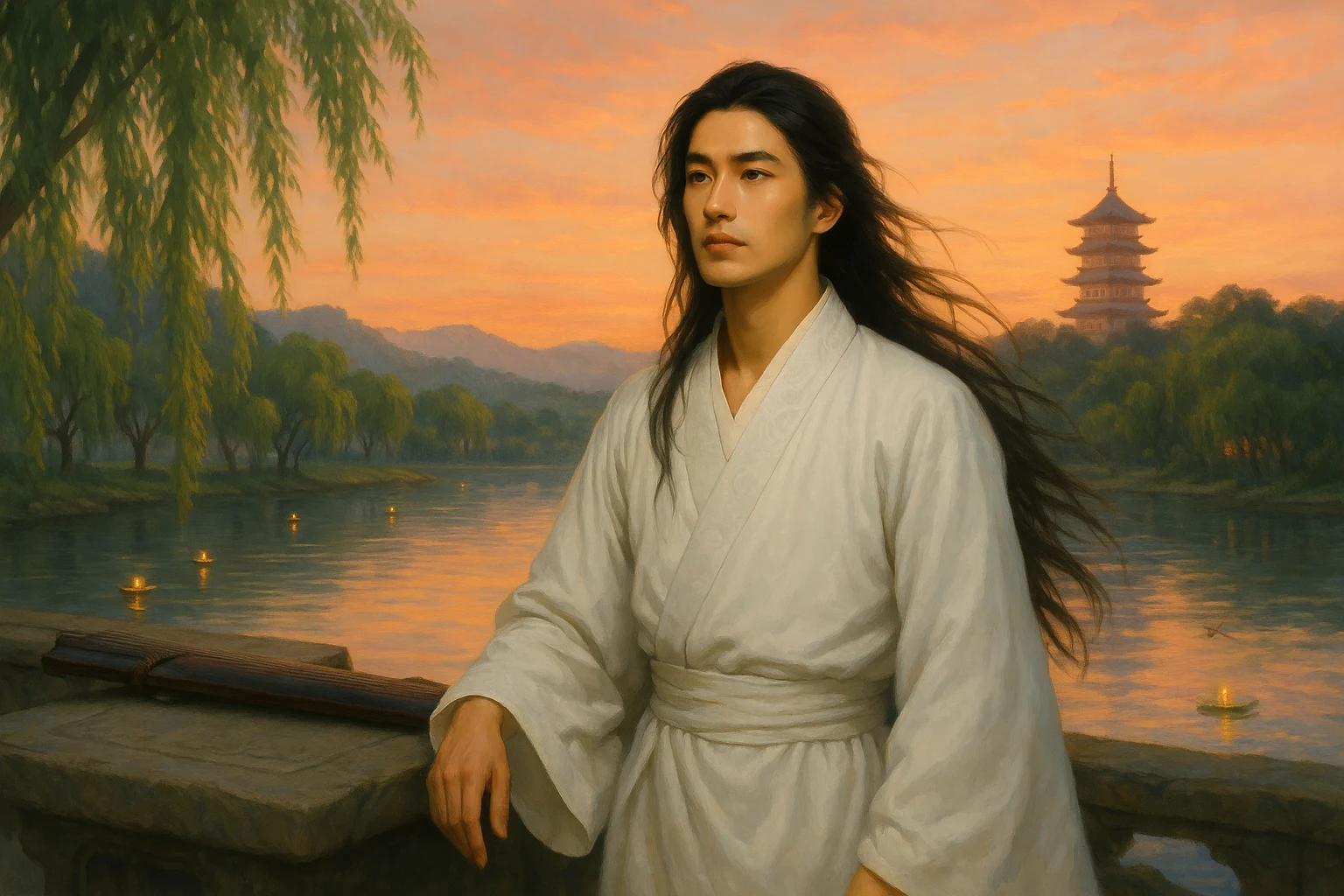
Bai Juyi (白居易), 772-846 AD, was originally from Taiyuan, then moved to Weinan in Shaanxi. Bai Juyi was the most prolific poet of the Tang Dynasty, with poems in the categories of satirical oracles, idleness, sentimentality, and miscellaneous rhythms, and the most influential poet after Li Bai Du Fu.






